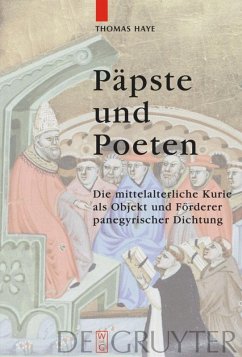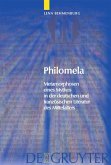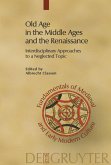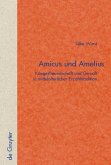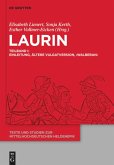During the Middle Ages, the Papal Curia was the most important addressee for learned Latin poetry within Europe. Much of it was unsolicited; authors address their works to the Apostolic See, they dedicate their writings to individual popes and glorify them in panegyrics. The study examines the expectations and aims associated with such poetry and to what extent the Curia responded to these poetic offerings â?? perhaps with material sponsorship for the authors. For this, it develops the paths of communication, the places of performance and modes of presenting this panegyric poetry.
Während des Mittelalters ist die päpstliche Kurie innerhalb Europas die wichtigste Adresse der gelehrten lateinischen Dichtung. Vielfach unaufgefordert, wenden sich die Autoren mit ihren Werken an den apostolischen Stuhl, sie widmen einzelnen Päpsten ihre Schriften und verherrlichen sie in Lobgedichten.
Im vorliegenden Buch wird für den Zeitraum vom 6. bis zum frühen 15. Jahrhundert untersucht, welche Erwartungen und Ziele mit dieser Dichtung verbunden waren und inwieweit die Kurie - etwa durch materielle oder soziale Förderung der Autoren - auf das poetische Angebot reagiert hat. Dabei werden auch die Kommunikationswege, die Aufführungsorte und die Inszenierungsmodi dieser panegyrischen Poesie herausgearbeitet.
Während des Mittelalters ist die päpstliche Kurie innerhalb Europas die wichtigste Adresse der gelehrten lateinischen Dichtung. Vielfach unaufgefordert, wenden sich die Autoren mit ihren Werken an den apostolischen Stuhl, sie widmen einzelnen Päpsten ihre Schriften und verherrlichen sie in Lobgedichten.
Im vorliegenden Buch wird für den Zeitraum vom 6. bis zum frühen 15. Jahrhundert untersucht, welche Erwartungen und Ziele mit dieser Dichtung verbunden waren und inwieweit die Kurie - etwa durch materielle oder soziale Förderung der Autoren - auf das poetische Angebot reagiert hat. Dabei werden auch die Kommunikationswege, die Aufführungsorte und die Inszenierungsmodi dieser panegyrischen Poesie herausgearbeitet.

